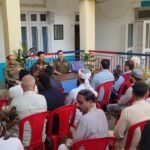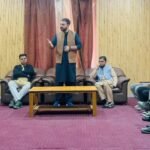The Crime Branch of Jammu and Kashmir Police, in collaboration with the Union Ministry of Home Affairs and the Academy of Art, Culture and Languages, today organised a Union Territory-level conference on Anti-Human Trafficking at Tagore Hall, Srinagar.
The event brought together senior police officials, government representatives, legal experts, NGOs, and other stakeholders to deliberate on strategies, challenges, and collaborative measures to counter human trafficking.
Special DG Coordination PHQ, S.J.M. Gillani, who was the chief guest, spoke about the legal framework, networks, prosecution, and other critical areas of concern. He highlighted that trafficking often overlaps with drug and arms smuggling networks, making it a complex challenge.
“What sets trafficking in persons apart is its human cost — shattered lives, broken families, and lasting trauma,” Gillani remarked. He stressed that combating the crime requires not only enforcement but also empathy and rehabilitation. He further observed that low conviction rates, weak enforcement, procedural delays, and corruption remain major hurdles globally.
Gillani underlined that prevention must remain central to anti-trafficking efforts, particularly in border and conflict regions. “Educated, economically secure, and rights-aware communities are less vulnerable to exploitation,” he noted. He also emphasized the role of technology, including advanced surveillance and data-driven interventions, to strengthen enforcement.
He urged officers to combine professionalism with compassion in tackling the menace. “Through coordinated enforcement, community partnership, and a holistic approach to human security, we can make a lasting difference,” he added, commending the efforts of J&K Police, the Ministry of Home Affairs, NGOs, and other stakeholders.
Additional DGP and Director Fire & Emergency Services, Alok Kumar, in his address, linked human trafficking to the global problem of black money. He stressed the need for continuous efforts, social media awareness campaigns, community involvement, and strong deterrence through exemplary punishment.
Convenor of Just Rights for Children, Ravi Kant, highlighted gaps in enforcement that traffickers exploit. He called for a comprehensive approach combining tighter laws, effective enforcement, and stronger victim protection measures, along with collaboration between law enforcement, civil society, and international agencies.
Expert trainer Rajesh Mani, a resource person for the conference, shared insights on prevention, victim support, and coordinated responses, while also highlighting best practices and the need for multi-agency cooperation.
Earlier, in his welcome address, IGP Crime Sujit Kumar stressed the importance of collective efforts in the fight against human trafficking and urged youth to draw maximum benefit from the knowledge shared during the conference. (Agencies)









